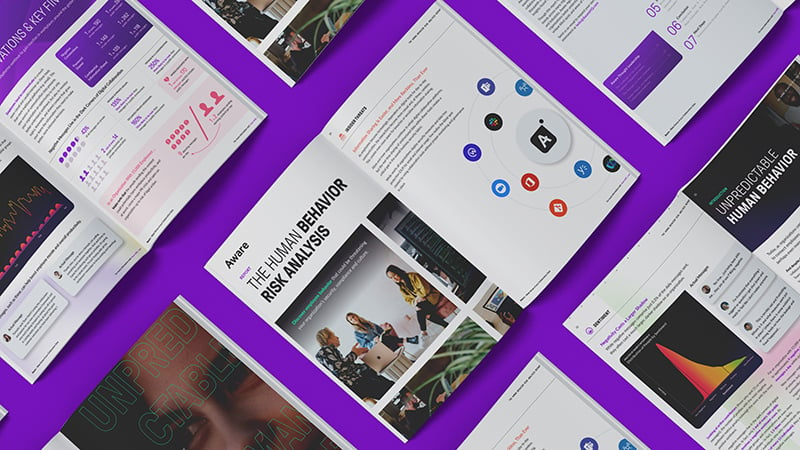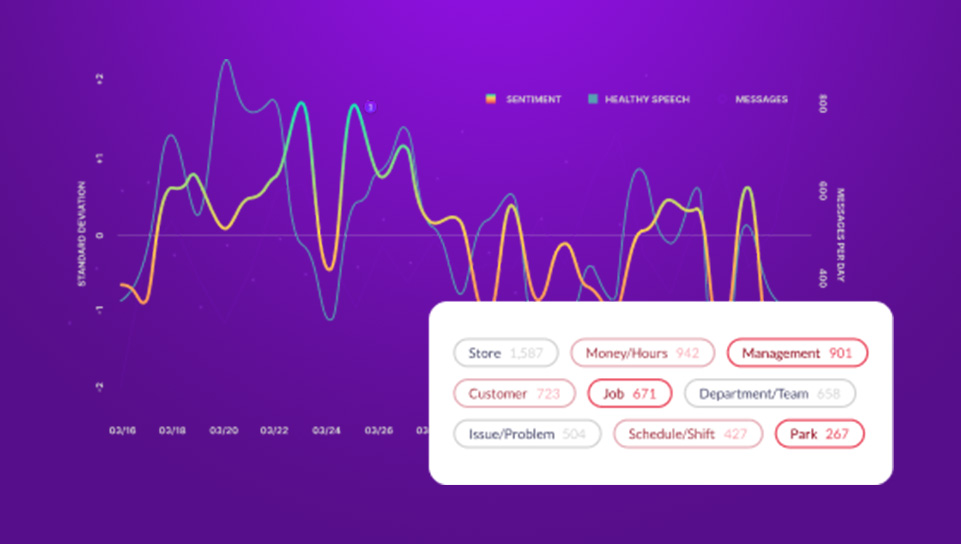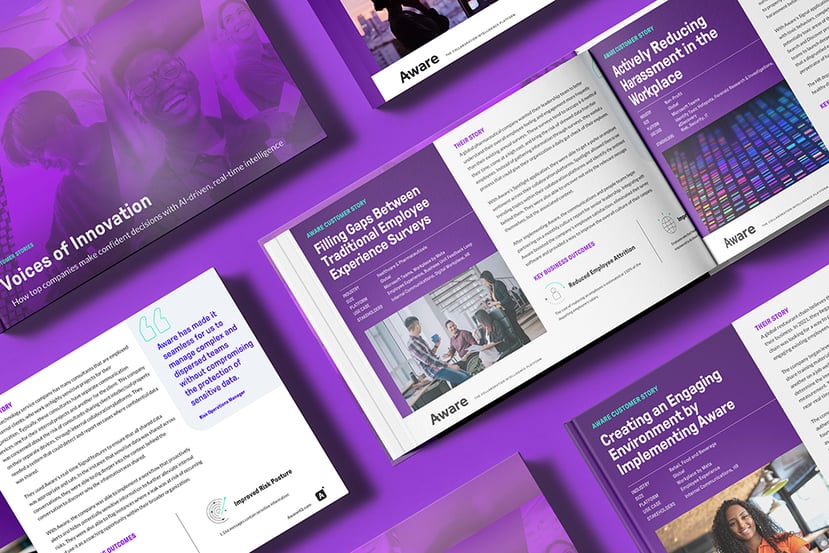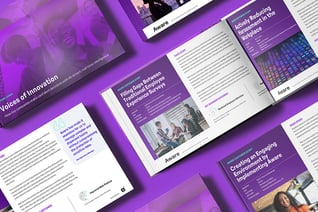Stop Wasting Time and Money in Legal Discovery: Start With Insights From Your Digital Workplace
by Aware
First Published Oct. 2020. Updated Mar. 2024.
Settlement strategies and trial outcomes often hinge on the ability to surface relevant data for a case. Legal discovery is the practice of identifying, collecting and producing electronically stored information (ESI) in response to a lawsuit or investigation.
Collaboration content must be discoverable
Any electronic information in your enterprise is potentially subject to eDiscovery, including text messages, social media posts, and data in collaboration tools like Slack, Microsoft Teams, Workplace from Meta, and Webex.
When it comes to enterprise collaboration, the average employee in a small-to-medium business sends 38 messages per day. In a single month, 2500 employees will exchange approximately 1.2 million messages. Contained within that dataset are an average of 239 passwords, 126 credit card numbers, and 717 instances of hate speech, along with numerous other pieces of risky and sensitive information.
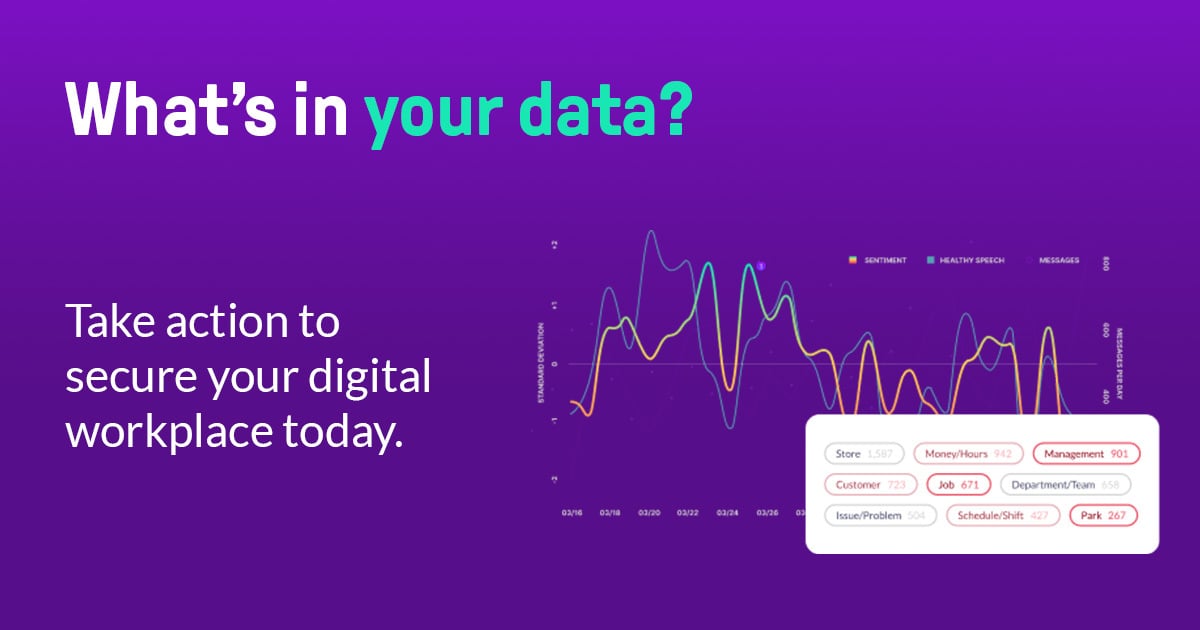
Worried about your exposure in collaboration tools? Get your personalized assessment now.
In a legal discovery scenario, how could you surface relevant communications in your digital workplace before it’s too late?
High data volume is the biggest obstacle for timely eDiscovery
An organized archive of communication data is the first step for successful eDiscovery processes. Massive amounts of unstructured data is dangerous, time consuming and expensive when an investigation arises.
Legal discovery can account for 20-50% of your company’s litigation expenses, primarily because of the difficulty of finding the “needle in the haystack” of collaboration messages. Proactively organize data to reduce costs, save valuable time and prepare for future litigation.
Proactive measures to simplify eDiscovery
The custodians of collaboration tool data are free to edit or delete their messages at any point after sending, creating a new nightmare for legal officers looking to understand the facts surrounding a cause of action. Maintaining an organized, immutable archive of all collaboration messages captured in real time is the only way to see the full picture.

Learn more about collaboration data archiving from Aware
Next, make your archive actionable with AI-infused insights to enable federated search and expedite eDiscovery.
Performing an eDiscovery investigation of a communication dataset is much more than looking for one, unique piece of data. The context surrounding the individual messages is critical to make sense of data in question.
Save time and money when you use AI-powered insights-as-a-service to parse through communication data and gain a foundational understanding of the content living in your tools before performing any specific search activities.
There are three key insights features that can save your legal team time and money: topic reports, conversation health metrics and conversation sentiment metrics.
1. Topic Reports
Topic reports are useful to understand where employees are talking about certain phrases or themes.
For example, let’s say one of your employees is accused of money laundering. Your legal team can kick off a discovery process with a topic investigation surrounding the alleged crime and attain a primary understanding of who talked about the issue, when and where.
With these insights, your team can granularly target individual keyword queries and investigations into individual authors.
2. Conversation Sentiment
Conversation sentiment is the measure of emotion that lies behind messages within your collaboration platform.
These metrics allow your team to go beyond simple keyword searches. Consider identifying messages of interest when searching for positive or negative sentiment in messages that contain incriminating terms.
3. Conversation Health
Conversation health measures communications for work-appropriateness. Unhealthy conversations contain swear words, sexual innuendos, hate speech, bias, inappropriate slurs, or any other sort of derogatory language.
Surface ‘smoking gun’ communications when you look for communications that are marked as unhealthy or even toxic. Save time and effort when you identify inappropriate, hateful and offensive messages before launching your investigation.
Choose an eDiscovery solution that makes searching messages a breeze
Most collaboration platforms export JSON files that are complicated and difficult to read. Aware’s proprietary classification engine returns JSON files to conversational format—the way they were supposed to be read—and makes them instantly searchable by custodian, timestamp, keyword, message type, and more.
In a legal discovery scenario, the difference between winning or losing a case can easily rest in your team’s ability to find pertinent evidence. Invest in technology that understands your communication data so that you can reliably and efficiently surface shared content when you need it most.
-min.png)
Make sense of JSON exports with Aware's intuitive eDiscovery solution
Stop wasting time and money when you invest in insights-as-a-service.
Save your legal discovery team’s time and money with a searchable collaboration data archive and insights-as-a-service. Learn more about how Aware categorizes, manages and analyzes the data living in collaboration tools like Microsoft Teams, Slack, Workplace from Meta, or Webex.
